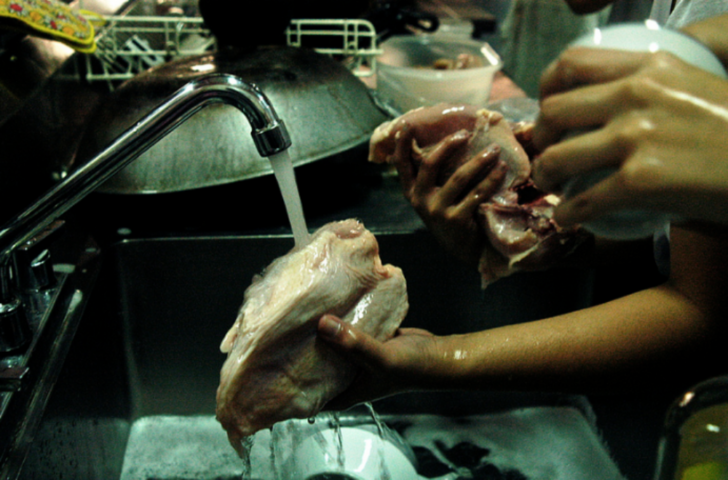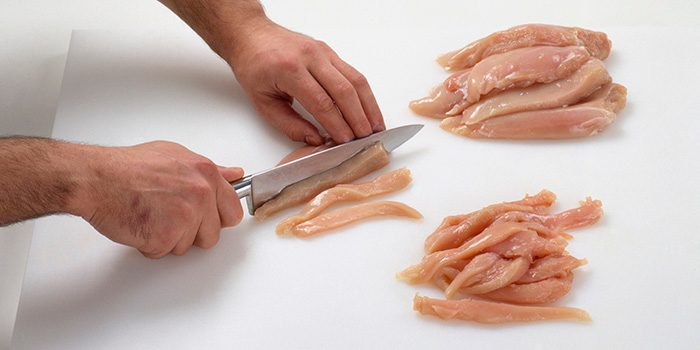For many home cooks, washing raw chicken before cooking is a long-standing practice passed down through generations. It seems logical—after all, we wash fruits and vegetables, so why not chicken? However, the Centers for Disease Control and Prevention (CDC) has issued a strong warning against this habit: Stop washing raw chicken! Why? It turns out that washing chicken can actually do more harm than good. Let’s explore why this common practice has been flagged as dangerous.
When you rinse raw chicken under the faucet, you’re not just removing surface residue. You’re also spreading harmful bacteria like Campylobacter, Salmonella, and Clostridium perfringens around your kitchen. These bacteria are some of the leading causes of foodborne illnesses, and when water splashes during washing, it can contaminate countertops, utensils, and even nearby foods. The CDC’s stance is clear: washing chicken doesn’t eliminate bacteria; instead, it increases the risk of contaminating your kitchen.
One of the biggest problems with washing raw chicken is that the bacteria are invisible. You can’t see where they’ve spread or how far water droplets have traveled. Even a tiny splash can carry harmful bacteria to areas you wouldn’t expect, making your kitchen a hotbed for cross-contamination.
Campylobacter is one of the most frequent culprits of food poisoning in the U.S., with raw chicken being a major source. Ingesting this bacteria can lead to stomach cramps, diarrhea, vomiting, and fever, with symptoms appearing within 2 to 5 days of exposure. The CDC estimates that about 1.5 million Americans are infected with Campylobacter annually. Salmonella, another dangerous bacterium commonly found in raw chicken, can cause severe gastrointestinal issues and can be life-threatening for the elderly or those with weakened immune systems. Both bacteria highlight the significant risks tied to improper handling of raw chicken.
So, what should you do instead of washing your chicken? The CDC advises that the safest way to eliminate bacteria is through proper cooking. Cooking chicken to an internal temperature of 165°F (75°C) effectively kills any harmful bacteria. Using a meat thermometer can ensure your chicken is thoroughly cooked, providing both safety and peace of mind.

The misconception that washing chicken removes bacteria is widespread, but the truth is that it does little to clean the meat. Washing doesn’t kill bacteria—it only increases the risk of spreading them. The CDC urges home cooks to skip this unnecessary step and focus on cooking their chicken properly instead.
Despite the CDC’s advice, many people cling to the tradition of washing chicken, often citing family practices of rinsing it with lemon juice or vinegar. This cultural divide between tradition and science has sparked ongoing debates, especially on social media. Some argue, “I’ve always done it this way and never gotten sick,” while others are open to changing their habits based on the latest research. The clash of old customs and modern science is a sticking point, but the scientific consensus is clear: washing raw chicken is a risky practice.
If you’re concerned about cleanliness when handling raw chicken, focus on maintaining proper kitchen hygiene rather than rinsing the meat. Always wash your hands thoroughly with soap and water after touching raw chicken, and disinfect any surfaces, cutting boards, or utensils that have come into contact with it. This approach is far more effective in preventing the spread of bacteria.
To further reduce the risk of cross-contamination, use separate cutting boards for raw meat and other foods like vegetables. After preparing chicken, clean and disinfect all surfaces and tools used during cooking. A clean kitchen, paired with careful food handling, is key to preventing foodborne illnesses.
In summary, the CDC’s recommendation to stop washing raw chicken is grounded in solid science. Although it may feel counterintuitive to some, understanding the risks of washing chicken can help you adopt safer food preparation practices. By focusing on proper cooking and kitchen hygiene, you’ll ensure that your meals are both safe and delicious. The bottom line? Skip the wash—let the heat do the work.